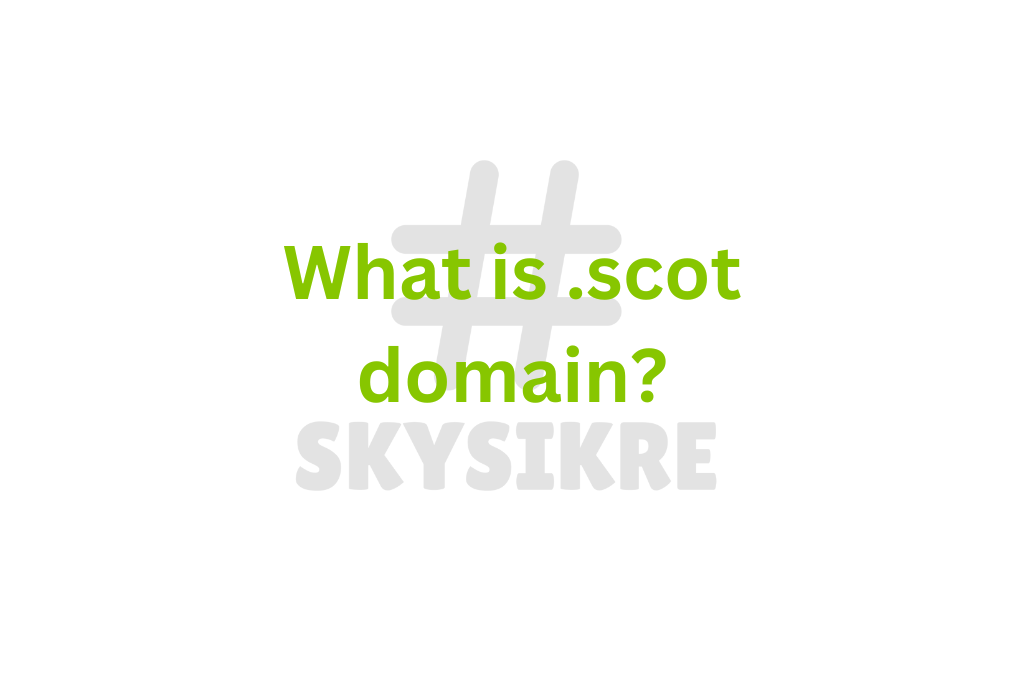Introduction to .scot Domain
The .scot domain is a top-level domain (TLD) specifically designed to represent Scotland and its people in the online environment. Launched in 2014, this domain extension serves as a digital identifier for individuals, businesses, and organizations that have a connection to Scottish heritage, culture, or interests. By adopting the .scot domain, users can effectively showcase their affiliation or pride in Scotland, while promoting their initiatives and activities within both local and global contexts.
The impetus behind creating the .scot extension was to foster a sense of community among Scots worldwide. It enables website owners to enhance their digital presence, making it clear to visitors that they are linked to Scotland in some way. Whether it be a blog celebrating Scottish literature, a business that emphasizes local products, or a cultural organization promoting traditional events, the .scot domain offers a unique opportunity for self-identification and engagement with audiences who share similar interests or backgrounds.
Furthermore, the .scot domain is pivotal in the promotion of Scottish identity. It has become a significant tool for advocating the rich heritage, languages, and traditions of Scotland. Organizations can leverage this TLD to raise awareness about issues affecting Scotland and to amplify their voices in discussions that matter to the Scottish community. The digital landscape powered by the .scot domain provides a platform where Scots can connect and collaborate, thus enriching their cultural narrative and enhancing their visibility on the internet.
In essence, the .scot domain is more than just a web address; it represents a collective aspiration among Scots to unite in the digital realm, reflect their unique culture, and foster connections that transcend geographical boundaries.
Benefits of Using a .scot Domain
Choosing a .scot domain offers a myriad of advantages for businesses and individuals seeking to establish a strong online presence that resonates with Scottish heritage. One significant benefit of adopting a .scot domain is the enhancement of regional credibility. By using this specific domain extension, businesses can signal their connection to Scotland, thereby instilling trust and confidence among local consumers and audiences who prioritize regional authenticity.
Moreover, utilizing a .scot domain allows for the cultivation of a robust community identity. As a symbol of national pride, this domain extension can help businesses align themselves with local values, traditions, and culture. By emphasizing their Scottish roots, companies can foster a sense of belonging among customers, ultimately encouraging loyalty and repeat business. This connection is particularly essential in markets where local patronage is vital for success.
In terms of search engine optimization (SEO), a .scot domain can significantly improve local visibility. Search engines often consider the geographic relevance of a domain when delivering results to users. Therefore, having a .scot domain can enhance local search rankings, making it easier for potential customers to discover businesses within their vicinity. As a result, organizations can attract a more targeted audience, including those searching specifically for services or products that celebrate Scottish identity.
Lastly, a .scot domain enables businesses and individuals to connect with target audiences who value their heritage. By embracing the .scot extension, organizations can appeal to customers seeking authenticity and a deeper understanding of the products and services they support. This unique positioning not only differentiates them from competitors but also helps emphasize their dedication to preserving Scottish culture.
Who Should Consider a .scot Domain?
The .scot domain represents a unique opportunity for various entities, particularly those that hold a connection to Scotland or wish to engage with Scottish audiences. This domain extension stands out as a symbol of Scottish identity and culture, making it particularly beneficial for specific sectors.
First and foremost, businesses in the tourism sector can greatly benefit from adopting a .scot domain. Scotland attracts millions of visitors annually, and a website with a .scot extension can enhance its visibility in search results among travelers who are specifically interested in Scottish experiences. For example, local tour operators or hotels promoting Scottish cultural heritage would find that a .scot domain can enhance their appeal, showcasing their commitment to the local culture and community.
Similarly, artisans and businesses focused on local crafts can leverage the .scot domain to reach audiences who have a keen interest in Scottish products. Whether it’s handmade tartans or traditional Scottish music instruments, utilizing a .scot extension can signal authenticity to consumers and convey a connection to Scotland’s rich artisanal history.
Furthermore, organizations dedicated to Scottish heritage, such as cultural associations, history societies, and educational institutions, stand to gain from using the .scot domain. By adopting this domain, these organizations can establish a strong online presence that resonates with their mission to promote Scottish culture and heritage, thereby attracting more members, sponsors, and funding.
Finally, businesses that target Scottish consumers, regardless of their geographical location, should consider a .scot domain. This includes online retailers that sell Scottish goods or services, as well as companies that aim to connect with the Scottish diaspora worldwide.
In conclusion, the .scot domain caters to a diverse range of individuals and businesses connected to Scotland. By recognizing its potential, these entities can harness the power of this domain extension to enhance their online presence and forge meaningful connections with their audience.
How to Register a .scot Domain
Registering a .scot domain involves several key steps, ensuring that the process is straightforward for individuals and businesses alike. The first step is to select a domain name that meets your needs while reflecting your identity or brand. It is essential to keep the name concise and relevant to your purpose. Once you have chosen a name, and verifying its availability is crucial. This can easily be done through various registrars or domain registration sites that list .scot domains.
Next, you need to choose an accredited registrar for the registration process. Several reputable registrars offer .scot domains, including Namecheap, GoDaddy, and 123 Reg. It is advisable to compare their pricing and services, as well as their customer support options, to find the best fit for your requirements. Ensure that the chosen registrar provides a user-friendly interface for managing your domain.
Once you have selected a registrar, you will need to create an account and provide your personal or business information. This typically includes your name, address, email, and contact details. After completing the necessary forms, you will also need to agree to the registrar’s terms and privacy policies. Payment is the next step, with most registrars accepting various payment methods, including credit cards and PayPal.
After payment has been handled, you will receive a confirmation email, and the registration process will initiate. It is important to keep track of your registration’s expiration date, as .scot domains usually need to be renewed annually. Some registrars might offer automatic renewal services to prevent accidental lapse. By following these steps and considering these factors, you can successfully register a .scot domain for your personal or business use, making a significant polish on your online presence.
Marketing Benefits of a .scot Domain
The .scot domain extension represents a unique opportunity for businesses and individuals connected to Scotland or aiming to engage with the Scottish community. By utilizing a .scot domain, organizations can enhance their marketing strategies in various ways, promoting brand positioning and visibility while fostering cultural relevance.
One of the primary advantages of adopting a .scot domain is its ability to support brand positioning. A .scot domain signals to customers that a business is rooted in Scottish culture, heritage, and values. This localized approach can attract consumers who value authenticity and a strong sense of community, thus giving businesses a competitive advantage. Brands that leverage the .scot domain can differentiate themselves in a crowded market, positioning themselves as more relatable and trustworthy to potential customers.
In addition to bolstering brand identity, a .scot domain can significantly improve visibility in local search results. Search engines increasingly prioritize local relevance in their algorithms. A domain that indicates a specific geographic focus, such as .scot, naturally aligns with these algorithms, potentially enhancing a business’s position in search results related to Scottish interests. This can lead to improved website traffic, generating more leads and opportunities for conversion as more users discover the business online.
Moreover, businesses using a .scot domain have the unique capability to provide culturally relevant content. By creating and sharing content that resonates with the Scottish audience, organizations can engage effectively, building a loyal customer base. This approach not only fosters community but also places businesses in a favorable light as they contribute to the promotion of Scottish culture and values through their marketing efforts.
In conclusion, adopting a .scot domain presents numerous marketing benefits, from enhancing brand positioning and visibility to enabling culturally resonant content creation, making it an ideal choice for businesses looking to engage with the Scottish community.
Potential Drawbacks of a .scot Domain
The choice to register a .scot domain may not be suitable for every individual or business, and several drawbacks warrant consideration. One primary concern is the potential for market misinterpretation. While the .scot domain clearly signifies a connection to Scotland, it may inadvertently alienate potential customers who do not associate the domain with credibility or relevance. Businesses targeting a global audience might find that a .scot extension limits broader appeal, especially as consumers increasingly gravitate towards more traditional domain endings like .com or .org.
The niche nature of the .scot domain also raises questions about target demographics. While it effectively represents Scottish heritage, culture, or services, businesses operating outside of these categories might find themselves in a constrained market. This specificity can be a double-edged sword; while it potentially attracts a focused audience interested in Scottish culture, it might simultaneously deter those seeking more general goods or services. The unique branding associated with .scot could result in missed opportunities to engage with a wider customer base.
Furthermore, there are technical aspects related to managing a .scot domain that may present challenges. Like any domain, ownership comes with responsibilities such as ensuring it conveys the right message and maintaining technical performance. If not properly managed, a .scot domain can lead to issues related to search engine optimization and visibility. Businesses must invest time and resources into effectively marketing their site to ensure it stands out amongst online competitors. Consequently, the effectiveness of a .scot domain will heavily depend on strategic planning and execution.
Real-life Case Studies
The .scot domain has been embraced by various businesses and organizations, showcasing its utility in enhancing branding and community connection. One notable example is the traditional Scottish whisky brand, GlenScot Distillers, which adopted the .scot domain to reinforce its cultural heritage while simultaneously modernizing its online presence. By utilizing glenscot.scot, the distillery not only distinguished itself from competitors using conventional domains but also amplified its commitment to Scottish craftsmanship, helping to attract tourists and whisky enthusiasts alike.
Another remarkable case is that of a tech startup, InnovateScot, which leverages the .scot domain to highlight its origin and connect with Scotland’s thriving tech community. The choice of innovatescot.scot as its web address serves dual purposes: it enhances local brand identity and positions the startup as a proud representative of Scotland’s innovation sector. This branding strategy has greatly contributed to its success in attracting like-minded partners and investors who share a passion for fostering the local economy.
Community organizations have also successfully utilized the .scot domain to strengthen their outreach. An example is the Scottish Wildlife Trust, which transitioned its web presence to wildlifetrust.scot. The adoption of the .scot domain significantly improved its visibility in Scotland, fostering greater engagement with local communities concerned with conservation efforts. This domain choice has not only helped in building a coherent identity but has also been pivotal in enhancing campaign reach for environmental initiatives across the nation.
These real-life case studies exemplify the beneficial impact of the .scot domain on businesses and organizations, amplifying their branding, marketing strategies, and engagement with the local community. Each example demonstrates that by adopting a relevant and culturally significant domain, entities can foster a more compelling narrative and create lasting connections with their audience.
SEO Considerations for .scot Domains
As businesses increasingly recognize the value of establishing a strong online presence, the choice of domain extension becomes a fundamental consideration. The .scot domain, purposefully designed to resonate with Scottish culture and identity, offers unique opportunities for Local Search Engine Optimization (SEO). To maximize the effective use of a .scot domain, it is essential to understand and implement certain SEO best practices tailored specifically for this extension.
First and foremost, optimizing a .scot site begins with comprehensive keyword research that focuses on geographic and cultural elements related to Scotland. Employing geographic keywords can significantly enhance visibility in local search results. For instance, incorporating terms such as “Scotland,” “Scottish,” or even specific regional names enables businesses to connect more effectively with local audiences. This practice not only improves organic rankings but also ensures that the content remains relevant to the intended user base.
Moreover, the importance of local content targeting cannot be overstated. Creating content that speaks directly to the Scottish community or engages with local cultural events can markedly improve audience engagement and relevance. Businesses operating under a .scot domain should consider inclusive approaches, such as integrating traditional Scottish references, cultural values, and local dialects into their web content. This can be achieved via blog posts, community highlights, or promotional campaigns that celebrate Scotland’s rich heritage.
Additionally, leveraging local backlinks from authoritative Scottish websites to enhance domain authority is crucial. Collaborating with local businesses, participating in community events, or contributing to regional publications forms effective strategies for cultivating these valuable backlinks. Such actions not only strengthen the credibility of your .scot domain but also position your business as a genuine player in the local market.
In essence, the strategies for optimizing a .scot domain hinge on a robust understanding of both local cultural connections and SEO practices. Balancing these aspects will prove beneficial for businesses aiming to thrive online while maintaining an authentic Scottish identity.
Conclusion: Is .scot Right for You?
As we have explored throughout this article, the .scot domain offers a unique opportunity for individuals and organizations wanting to establish a distinct online presence. By using a .scot domain, you not only reflect a connection to Scottish heritage but also engage meaningfully with the local community and breed a sense of authenticity within your brand.
When considering whether a .scot domain fits your needs, it is vital to evaluate your target audience. If your primary market consists of individuals or businesses closely aligned with Scottish culture or geography, a .scot domain can significantly enhance your visibility and strengthen your brand identity. This designation helps you stand out in a crowded marketplace while making it clear to users that you are connected to Scotland and its communities.
Furthermore, businesses seeking to foster community engagement will find the .scot domain particularly advantageous. By adopting this extension, you demonstrate a commitment to local networks, which can translate to increased loyalty among customers who value regional pride. Whether you are promoting Scottish events, heritage, or contemporary projects, the .scot domain can be instrumental in cultivating a vibrant online presence.
However, it is essential to weigh the potential benefits against your brand strategy and objectives. If your business extends beyond Scotland or aims to attract a global audience, it may be beneficial to consider other domain options that resonate with broader markets. Ultimately, the decision to opt for a .scot domain should align with your long-term vision, audience expectations, and brand values.
In conclusion, assessing the .scot domain’s suitability involves examining your business goals, target demographics, and community involvement. With thoughtful consideration, you can determine whether this domain extension represents the right fit for you or your business.






